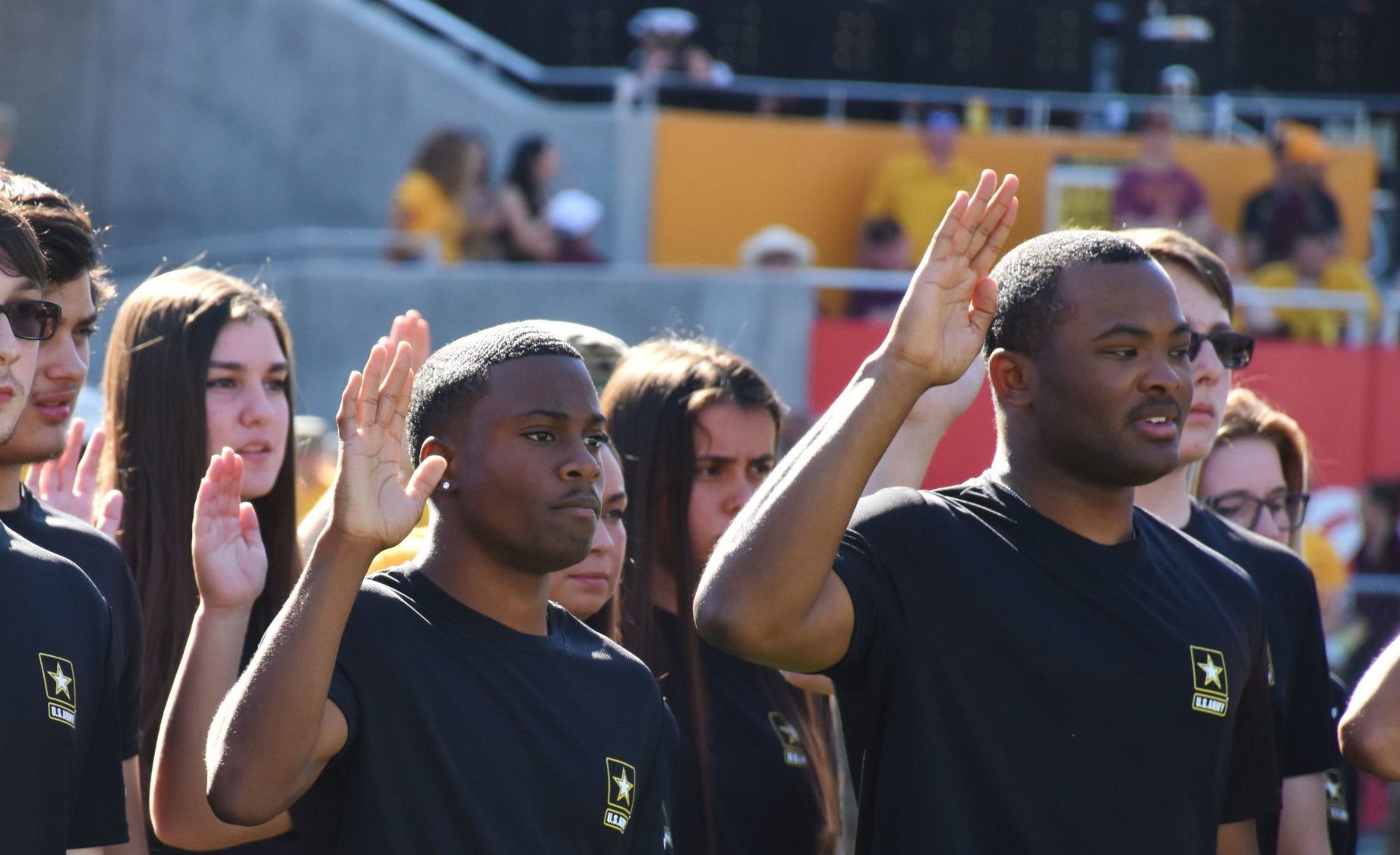

The Army needs more soldiers in infantry, air defense, electromagnetic warfare, and combat medic fields as the service faces one of its toughest recruiting environments since the creation of the all-volunteer force.
In addition to its recruitment challenges, the low unemployment rates across the country have also spelled trouble for the Army’s civilian career paths. Officials said the service is looking to fill around 500 empty civilian positions at its “total Army” career fair on April 13, in Arlington, Texas at the Globe Life Field baseball stadium.
“This is different than most of the hiring that the Army has done in the past in that it is only Army,” Roy Wallace, assistant to the Army’s Deputy Chief of Staff told a group of reporters this week. While at other job fairs “you’re competing with everybody under the sun,” Wallace said, “this is going to be only Army, both military and civilian – that makes it different.”
The job fair will host representatives from 43 Army commands – some U.S.-based and others with an international presence.
“Part of the reason that we’re going out to different locations is we recognize that most Americans don’t venture far from their hometown during their life so you gotta go where they are, you gotta meet them where they are,” Wallace said.
The Army will be looking for candidates for jobs with the most need which include:
- Infantry
- Indirect Fire Infantryman
- Cannon Crewmember
- Joint Fire Support Specialist
- Rocket System Crewmember
- Weapons Locating Radar Operator
- Patriot Fire Control Enhanced Operator
- Air Defense Battle Management System Operator
- Air & Missile Defense Crewmember
- Electromagnetic Warfare Specialist
- Special Operations
- M1 Armor Crewman
- Network Communication Systems Specialist
- Foreign Language Specialist
- Combat Medic
- Explosive Ordnance Disposal (EOD) Specialist
Civilian jobs
While the Army has been vocal about its recruiting crisis due to image problems with Gen Z, Americans’ waning trust in public institutions, and competition with the private sector, the service has put out less information about challenges with its civilian workforce which is made up of roughly 240,000 civilians.
Over the last three years, the Army has seen “record-breaking retirements,” according to Wallace. In order to maintain a steady workforce, their efforts are focused on hiring younger people who can be trained and retained, he added.
“I don’t know if I can blame that on COVID and the outcomes of COVID and things like that, but we have been seeing a larger than normal retirement rate which means you gotta replace those people,” he said. “Those people that are retiring are your folks with a lot of experience, so you’ve got to start early. You’ve gotta get the younger people in.”
The service will be hiring full-time civilians in STEM fields, digital technology, construction, logistics, security intelligence, child care, medical, human resources, education, contracting, and professional services. The Army has set aside $1 million to offer civilian bonuses, Wallace said.
Subscribe to Task & Purpose today. Get the latest military news and culture in your inbox daily.
One of the biggest civilian job gaps that officials are looking to fill will be for candidates with social worker and psychological educational backgrounds to be part of the Department of Defense’s suicide prevention program. The Army, in particular, will be offering more than 2,000 positions across the U.S.
While the military has always recruited locally for troops, on the civilian side, the government typically uses USAJobs where people apply online, “so if they miss the opportunity it’s gone.”
“Being on-site and bringing all of the commands with the jobs themselves, that gives the individual that’s looking for a job, the ability to actually engage with the people that are gonna make the decisions on who they hire and who they don’t,” he said.
Retaining soldiers for civilian jobs
Wallace said the Army also hopes the job fair will be valuable for soldiers serving in the Texas National Guard, Army Reserve, and cadets in ROTC since “all those individuals that are in those different organizations need a job other than the Army.”
For example, of the 5,400 cadets that graduate from ROTC in a year, around 3,100 will go into the active component full time which means the remaining one-third will need a full-time job.
“We are endeavoring to do on-the-spot hiring,” Wallace said. To make it more efficient, officials will also have the authority – for certain job specialties – to waive the legal requirement that prevents military retirees from working for DOD until six months after service.
Hiring through the federal job system can be hard, Wallace said, but “we’re going to do our darndest” to give out jobs to candidates who come prepared. Civilian hires should have resumes ready and veterans should bring DD214 (discharge records) or DD215 (military record corrections) paperwork.
Army officials have met with the Dallas city council, the mayors of Arlington and Fort Worth, Texas, and all of the local universities like the University of Texas, Texas A&M, and North Texas State, “to bring all of these people that are just about to graduate most likely and maybe not have a job.”
“The younger generations are looking to be part of something that’s bigger than they are. We definitely offer them that opportunity,” Wallace said. “Whether it’s in uniform or in slacks or in a suit or whatever, we offer those opportunities.”
The latest on Task & Purpose
- Air Force special operators must take class before getting shaving waivers
- Camp Pendleton Marines encouraged to fix their own barracks rooms
- 101st Airborne soldiers are first to receive new Next Gen Squad Weapon
- Air Force fires commander of Holloman maintenance group
- Army investigating Nazi imagery on Special Forces patch posted online
